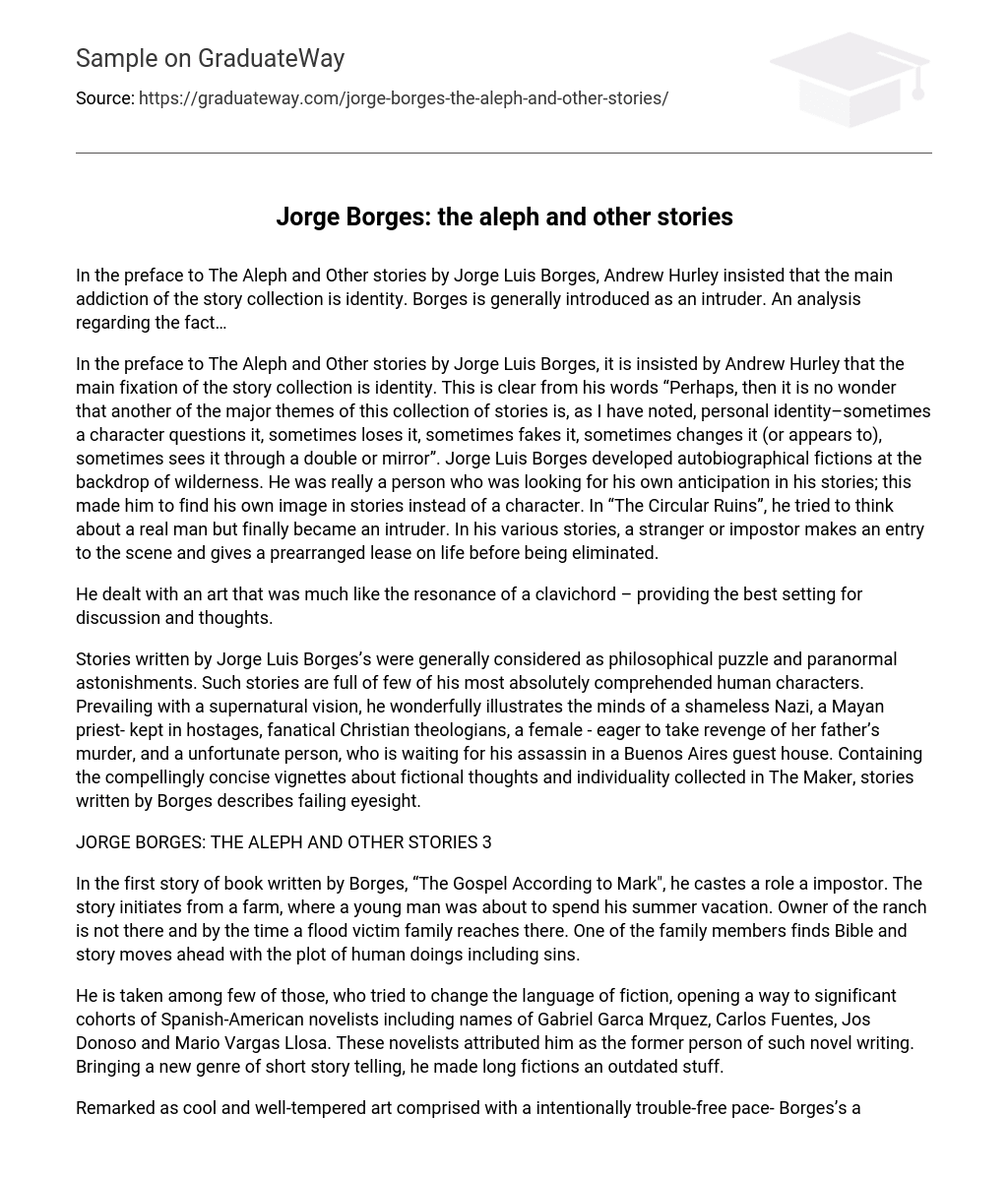In the preface to The Aleph and Other stories by Jorge Luis Borges, Andrew Hurley insisted that the main addiction of the story collection is identity. Borges is generally introduced as an intruder. An analysis regarding the fact…
In the preface to The Aleph and Other stories by Jorge Luis Borges, it is insisted by Andrew Hurley that the main fixation of the story collection is identity. This is clear from his words “Perhaps, then it is no wonder that another of the major themes of this collection of stories is, as I have noted, personal identity–sometimes a character questions it, sometimes loses it, sometimes fakes it, sometimes changes it (or appears to), sometimes sees it through a double or mirror”. Jorge Luis Borges developed autobiographical fictions at the backdrop of wilderness. He was really a person who was looking for his own anticipation in his stories; this made him to find his own image in stories instead of a character. In “The Circular Ruins”, he tried to think about a real man but finally became an intruder. In his various stories, a stranger or impostor makes an entry to the scene and gives a prearranged lease on life before being eliminated.
He dealt with an art that was much like the resonance of a clavichord – providing the best setting for discussion and thoughts.
Stories written by Jorge Luis Borges’s were generally considered as philosophical puzzle and paranormal astonishments. Such stories are full of few of his most absolutely comprehended human characters. Prevailing with a supernatural vision, he wonderfully illustrates the minds of a shameless Nazi, a Mayan priest- kept in hostages, fanatical Christian theologians, a female – eager to take revenge of her father’s murder, and a unfortunate person, who is waiting for his assassin in a Buenos Aires guest house. Containing the compellingly concise vignettes about fictional thoughts and individuality collected in The Maker, stories written by Borges describes failing eyesight.
JORGE BORGES: THE ALEPH AND OTHER STORIES 3
In the first story of book written by Borges, “The Gospel According to Mark”, he castes a role a impostor. The story initiates from a farm, where a young man was about to spend his summer vacation. Owner of the ranch is not there and by the time a flood victim family reaches there. One of the family members finds Bible and story moves ahead with the plot of human doings including sins.
He is taken among few of those, who tried to change the language of fiction, opening a way to significant cohorts of Spanish-American novelists including names of Gabriel Garca Mrquez, Carlos Fuentes, Jos Donoso and Mario Vargas Llosa. These novelists attributed him as the former person of such novel writing. Bringing a new genre of short story telling, he made long fictions an outdated stuff.
Remarked as cool and well-tempered art comprised with a intentionally trouble-free pace- Borges’s art was stirring. He tried to convey human sides. In his accordance every thing provided to a human being is a raw material, which he/she can use to identify herself/himself using the art of identification. This is clear from his quote *“A writer — and, I believe, generally all persons — must think that whatever happens to him or her is a resource. All things have been given to us for a purpose, and an artist must feel this more intensely. All that happens to us, including our humiliations, our misfortunes, our embarrassments, all is given to us as raw material, as clay, so that we may shape our art”* (Jorge Luis Borges). This quote also tells about the fascination of identity. He was thinking traditions can survive any thing. He was a dreamer, whose dream was larger than individual imagery. At one place in his book *“El hacedor, 1960”, he writes, “A man sets out to draw the world. As the years go by, he peoples a space with images of provinces, kingdoms, mountains, bays, ships, islands, fishes, rooms, instruments, stars, horses, and individuals. A short time before he dies, he discovers that the patient maze of lines traces the lineaments of his own face.*” -Jorge Luis Borges (El hacedor, 1960). This reflects his vision walking en route almost every thing present on the planet.
Citatation:
Book
The Aleph by Jorge Luis Borges
El hacedor, 1960 By Jorge Luis Borges
Dr. Brodie’s Report , 1st story, (Jorge Luis Borges)





